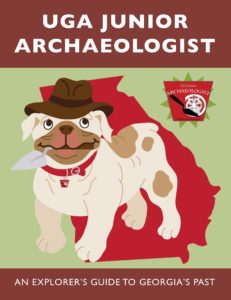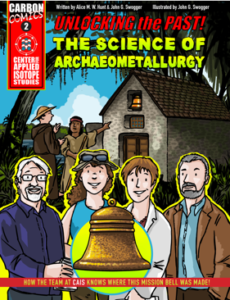CAIS offers a wide range of curricular and extracurricular learning activities including: bilingual STEM comic books;
Jr. Archaeologist Program; and NGSS curriculum.
In keeping with the University System of Georgia STEM Initiative Goals and the Mission of the University of Georgia’s Office of STEM education, CAIS has actively sought to better prepare K12 students for success in STEM careers and college majors. Our approach has focused on student learning directly, instructional support for teachers, and the development of curricular tools. CAIS has provided formal and informal STEM learning across the State, including 12 CAIS staff serving as judges for the Georgia State Science Fair and mentors for 5 student science fair projects over three years. CAIS scientists have also provided classroom programming and instruction, including teaching 250 7th graders in the Oconee County School District about the difference between ions and isotopes using 3D modelling. In December 2017-2018, CAIS collaborated with the Clarke County School District to hold a Saturday STEAM Academy at W.R. Coile Middle School. This 20-week Academy will engage students in experiential learning through the application of STEAM disciplines to community issues, such as water quality and transportation. Using design processes, multimodal communication through art, text, and oral presentations, and grade-level science and math standards and content knowledge, 50 youth, ages 11–14, will learn to integrate knowledge, define problems, move between the concrete and the abstract, and cultivate an interest and skills for success in STEM careers.
Since 2016, CAIS has provided informal experiential learning to more than 400 children and youth through participation in public events, such as CoastFest and Google’s Gravity Games. At these events, scientists interact with youth (and parents) through experiments and hands-on technology, such as portable X-ray Fluorescence and ground penetrating radar. CAIS scientists also participate in Clarke County School District programs, such as the Eclipse Blackout event, summer camps, such as Camp DIVE , and collaborative programs such as Fossil Finders. Camp DIVE is a free community resource providing the County’s youth, age 5–14, a summer enrichment program through which they can discover their potential, inquire about the world, voice their ideas, and explore their communities. In collaboration with the College of Education, CAIS developed a 2-week module focused on food and nutrition. The 50 students who participate in the module each year engage in activities such as, keeping a food journal and calculating how much sodium, sugar, and fat they consume vs. how much is recommended that they consume, and evaluating and plotting foods on a graph of the satiety index and glycemic index. To date, this module has run for 3-years, impacting approximately 150 youth.
CAIS Scientists and Graduate Research Assistants have worked with Georgia State K12 teachers to develop research-based curriculum using the Georgia Standards of Excellence.
Through SciREN Georgia, the State’s Science Researchers and Educators Network, CAIS has developed 4 curriculum units for middle and high school, and one for early elementary. These curricula are available open-access online and have the potential to impact hundreds of children, youth, and their teachers state-wide. In addition, CAIS has been in conversation with Georgia Department of Education about adopting its STEM comic book series into the formal curriculum.
The STEM comic book series is one of two extracurricular tools developed by CAIS scientists and Graduate Students. Each comic is designed for a 6th grade reading competency and walks youth through the analytical research process of actual CAIS scientists in answering real-life science questions. The comics are bi-lingual, Spanish-English, and combine cognitive learning related to State Math and Science Standards with interesting real-world application. Carbon Comics has the potential to engage thousands of youth across Georgia, and has currently been requested for use by non-UGA programs at Robins Air Force Base, and an afterschool program in San Diego. An additional outreach tool developed by CAIS (in collaboration with anthropology graduate students) is the UGA Junior Archaeologist Program.


